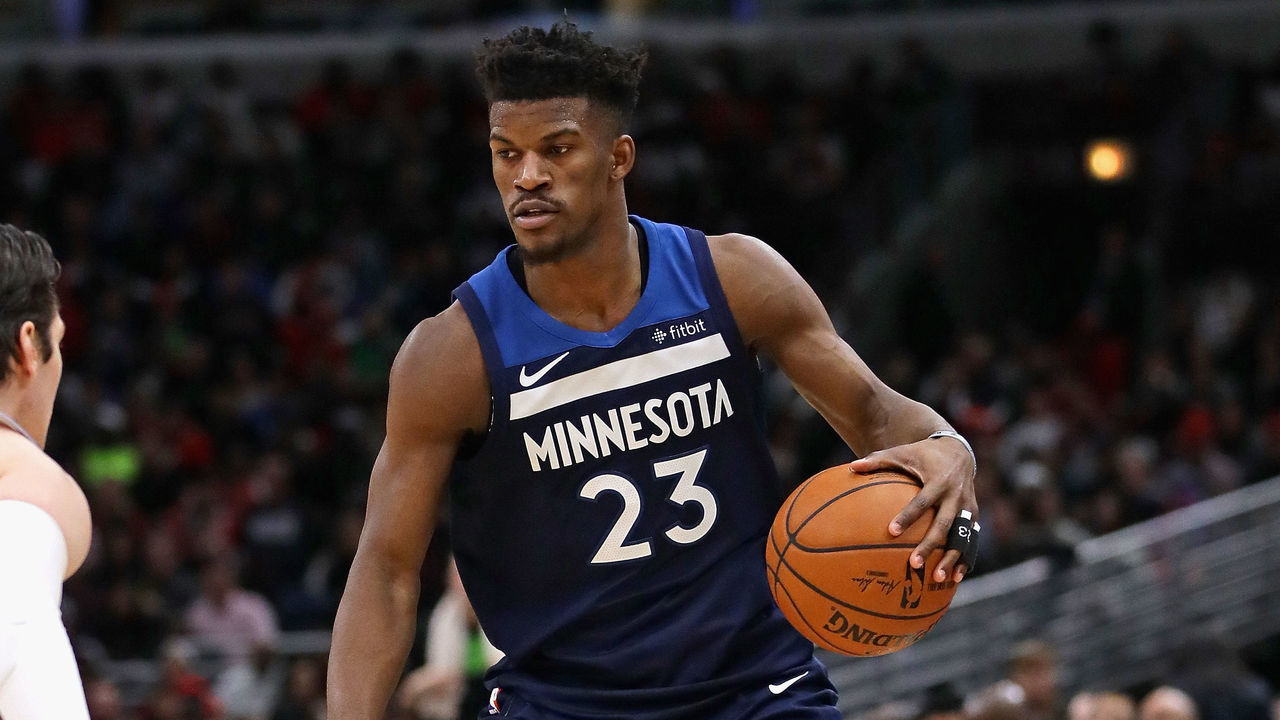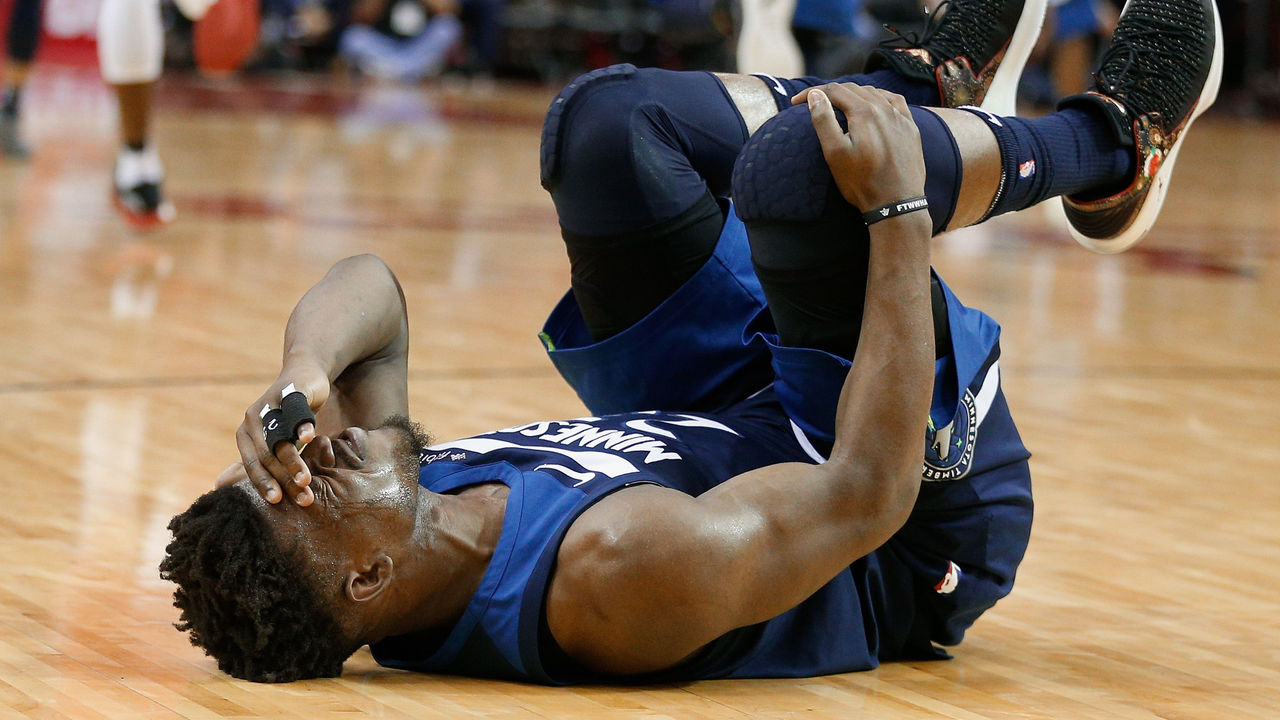Better Luck Next Year - Minnesota Timberwolves edition
As NBA teams are officially eliminated from title contention, theScore NBA freelance writer Andrew Unterberger takes a look back at the highs and lows of their season, along with the biggest questions ahead of 2018-19. The 18th edition focuses on the Minnesota Timberwolves.
The Good

Jimmy Butler's (brief) MVP candidacy. It's been a long time since Timberwolves fans could credibly chant "M-V-P!" at any player of theirs - though Kevin Love might've gotten a stray chant or two in his day out of sheer desperation. But blockbuster trade acquisition Jimmy Butler had a moment for Minny this season when he was beginning to at least elbow his way into the discussion: In mid-January, he was averaging 22-5-5 on good shooting with typically brilliant defense, as Minnesota got off to a resounding 29-16 start to the season, good for home-court advantage in the West. Minnesota was looking to trade for a superstar, and it undoubtedly got one - which in itself makes the season something of a success.
Karl-Anthony Towns' 56-point night. Butler is unquestionably the team's most important player right now, but Timberwolves fans certainly hope that won't be the case for too much longer, as the upside of prodigious big man Towns is what really gives the team its highest ceiling moving forward. The production came and went for KAT in his Junior season - though it was around often enough for him to earn his first-ever All-Star nomination. But his skills were on full display during a late-March home game against Atlanta, when the offensively versatile seven-footer hung 56 on the Hawks, on 19-32 FG, 6-8 3PT, and 12-15 FT. (He also had 15 boards and four assists.) It was a franchise record, and the explosion of fully realized dominance Wolves fans had long been hoping to see from their former No. 1 overall pick.
Taj Gibson's career year. For the first time since his rookie year, power forward Gibson played 82 games - and put up the best numbers of his career as the Timberwolves' bedrock starter. He averaged 12 and seven on 58 percent shooting, filling in the gaps between the team's higher-volume stars. rating as a net-positive on both sides of the ball and proving the forever-prototypical Tom Thibodeau player. He's not exactly the modern stretch four - and he's probably a large part of the reason the Wolves were second in the league in two-pointers attempted - but it's hard to imagine Minnesota would've been able to make the postseason without him.
Game 82. Speaking of Gibson and the playoffs: He had perhaps the Wolves' biggest play of the year, when his strip of Denver's Nikola Jokic at the end of regulation in the team's last game of the campaign forced overtime. It helped save Minnesota's season. The Wolves went on to beat the Nuggets in overtime of their play-in game, ensuring the team's first playoff berth in 14 years, and ending the longest-running postseason drought in the Association. "I'll probably fall asleep tonight and wake up in the middle of the night and start crying," commented Towns after the game.
One playoff win. Perhaps a single W in the postseason isn't much considering the expectations that swelled for Minnesota as it competed for the third seed early in the season. But for a team that hadn't been out of the lottery since the first Franz Ferdinand album, winning any playoff game - let alone one against the top-seeded Rockets - is a pretty big deal. It was a pretty decisive victory, too: 121-105, at home, with Towns, Butler, and Andrew Wiggins all posting strong performances. "This city deserves being in the playoffs a little bit longer," Butler said following the victory.
The Bad

Jimmy Butler's injuries. The Wolves would likely never have drawn a first-round lot against the West-best Rockets to begin with if not for late-season injuries to their new franchise player. It cost Butler 21 games and any chance at postseason awards consideration. The Wolves went 10-11 without the two-way wing, and dropped them from fighting for home-court advantage to fighting to be in the playoff picture at all in the crowded West. Though Minnesota found its way to the eighth seed, Butler was far from full strength in the playoffs, averaging just 16 points a game on 44 percent shooting in the Wolves' five-game loss to the Rockets.
Justin Patton, no help. Drafted out of Creighton with the 16th pick - via the Bulls, swapped as part of the Butler trade - Patton could've been valuable for the thin Wolves as a back-up big. But Patton played a scant four minutes all season for Minnesota's big-league squad, spending the rest of his time nursing foot injuries and putting up acceptable numbers (13 and 5 on 48 percent shooting) for the Iowa Wolves of the G League. "There's a lot of rust on him early," offered G League Wolves coach Scott Roth in mid-February. "But overall, he's been progressing really well and he has a really big upside."
No trust in the bench. The Wolves' starting five had one of the league's best net ratings; but of course, that's in large part because Thibodeau was relentless in their usage. The Jeff Teague-Wiggins-Butler-Gibson-Towns lineup averaged nearly 24 minutes a game together - easily the most-played regular lineup in the league. In fact, no one else on the team besides sixth man Jamal Crawford and Butler fill-in starter Nemanja Bjelica averaged more than 20 minutes a night (and the two of them only barely). It's long been the coach's M.O. to run his starters into the ground, but given the late-career decrepitude of Thibs alums Luol Deng, Joakim Noah, and Rose - and given that Butler already has a head start with his two-time coach - Wolves fans have to be a little worried about what this over-reliance will eventually mean for their younger stars.
Playoff Towns. KAT eventually rose to the occasion in the Wolves' first-round series against the Rockets - averaging 21 and 15 a game across the series' last three contests, shooting 55 percent from the field. However, he took a little too long to show up, scoring in the single digits and only taking nine shots in each of his first two playoff games. He also failed to serve as any kind of effective deterrent for the Rockets' super-powered offense: Houston's offensive-rating was nearly 30 points higher with Towns on the court than off - easily the worst split on the roster - showing how far the young All-Star still has to go to reach his MVP-type two-way potential.
What exactly does Wiggins do? The Wolves invested in their other former No. 1 overall pick over the summer with a five-year, nearly $150-million max deal, and Wiggins rewarded the team with easily his most disappointing season yet. In his first season on the wings with Butler, Wiggins posted 18 and 4 with his worst PER (13.0), True Shooting (51 percent) and free-throw rate (.242) of his career, while playing underwhelming defense and adding precious little else in the box score. Still seems like there's potential for the ultra-athletic, skilled wing to be more - maybe? probably? - but five seasons into his career is worrying late to still be trending in the wrong direction.
The Questions

Will Butler re-sign? There's not necessarily maximum urgency here: Butler has one more year on his deal, plus a player option for $20 million the year after. But failing further injury, he'll almost certainly turn down that 2019 option for a bigger-money long-term deal. It means the Wolves have just one season to lock up their best two-way player since KG before he goes looking for the latest big-market superteam elsewhere. Butler seems to relish being the guy in Minnesota, but he's likely past the point in his career where he'll be appeased with low-seed playoff appearances and first-round exits. So it might be on the Wolves and their young guys to prove to him that it's worth him sticking around before he re-ups for the remainder of his prime.
Can a bench be developed? Despite Thibodeau's lack of trust in them, the Wolves' bench has shown promise: Bjelica played well in Butler's stead, Tyus Jones was an unlikely Real Plus-Minus superstar as the team's backup point guard, and Gorgui Dieng is a reliable if overpaid frontcourt backup. (A healthy Patton might also see more burn with the big-league squad as a sophomore). Minnesota has too much money tied up in its core to pay for much depth on the open market, so it might be up for the team's incumbent reserves - all of whom besides Bjelica are still under contract for next season - to prove to the team's stubborn headmaster that they're worth deploying to spell the team's starters a little more.
Will there be any drama in extending Towns? Towns' rookie contract ends at the end next season - his fourth - and it should be something like a no-brainer on both sides to lock up the All-Star big for the foreseeable future. But the Wolves do have a lot of guaranteed money already through the next three seasons - including $63 million combined in 2019-20 for Wiggins, Teague, and Dieng (yikes!). And that's even before they extend Butler, who wouldn't be eligible for the super max, but could still swallow up most of the remainder of the Wolves' cap space. Towns is worth the stretch, and there's no indication yet he'd be averse to agreeing on his end, but Wolves fans are sadly familiar with the experience of their team alienating one future star by over-committing to another.
Is Wiggins' contract an albatross? It's close to impossible to over-extend a potential future star who's still only 23, but the Wolves may have found a way with Wiggins. The perennially inefficient prospect has yet to even begin his five-year, $146.5-million extension, and at the moment, he still barely rates as a net positive on the court, while also proving fairly enigmatic off it. If the Wolves made him available in the offseason, you can bet there'd still be suitors - every team believes its culture can be the one to turn a player like Wiggins around - and they'll probably try him with Butler and Towns for at least one more season before pulling the ripcord on his deal. But if he doesn't show real progress, and soon, his cap-clogging deal could short-circuit the Wolves' ability to properly build around their best two-man core in franchise history.
Is Thibs the guy long term? Despite leading the team to its best season in well over a decade, Thibodeau still came under fire this season for his seemingly archaic coaching methods: Exhausting his starters, building an offense around two-point shooting, building a defense around pick-and-roll ICE-ing, and so on. Despite making his name on D, the Wolves have not had their defensive rating rise outside of the NBA's bottom five in his two years in Minnesota, and any major injury suffered by one of his core players will invariably be blamed on his running them ragged. Anything but a clear leap forward for Thibs' Wolves in his third season, and the coach may be firmly on the hot seat before his five-year deal is up.
(Photos courtesy: Getty Images)